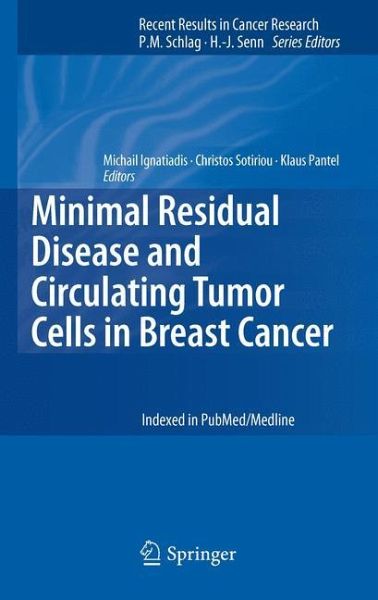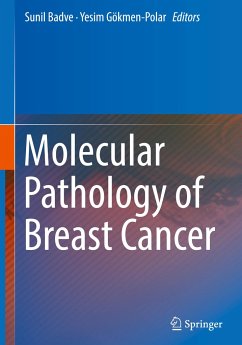
Minimal Residual Disease and Circulating Tumor Cells in Breast Cancer

PAYBACK Punkte
57 °P sammeln!
Most deaths from carcinomas are caused by the hematogenous dissemination of cancer cells to distant organs and the eventual development of metastases. When found in the bone marrow or peripheral blood of carcinoma patients, occult cancer cells are referred to as disseminated tumor cells (DTCs) or circulating tumor cells (CTCs). CTCs and DTCs are considered surrogates of minimal residual disease, i.e., the presence of malignant cells in distant organs that are undetectable by conventional imaging and laboratory tests used for tumor staging after curative surgery of the primary tumor.In this boo...
Most deaths from carcinomas are caused by the hematogenous dissemination of cancer cells to distant organs and the eventual development of metastases. When found in the bone marrow or peripheral blood of carcinoma patients, occult cancer cells are referred to as disseminated tumor cells (DTCs) or circulating tumor cells (CTCs). CTCs and DTCs are considered surrogates of minimal residual disease, i.e., the presence of malignant cells in distant organs that are undetectable by conventional imaging and laboratory tests used for tumor staging after curative surgery of the primary tumor.
In this book, leading investigators in the field provide up-to-date information on a series of important questions, including:
- How can the study of minimal residual disease and CTCs help us to better understand breast cancer metastasis?
- What technologies are available for the detection and characterization of CTCs and DTCs, and what are their relative merits?
- How are DTCs and CTCs relevant to clinical research and practice?
- What is the role of other blood-based biomarkers such as circulating endothelial cells and circulating nucleic acids?
- What are the challenges in drug and biomarker co-development and the use of CTCs for companion diagnostic development?
This book will be of interest and assistance to all who are engaged in the modern management of breast cancer.
In this book, leading investigators in the field provide up-to-date information on a series of important questions, including:
- How can the study of minimal residual disease and CTCs help us to better understand breast cancer metastasis?
- What technologies are available for the detection and characterization of CTCs and DTCs, and what are their relative merits?
- How are DTCs and CTCs relevant to clinical research and practice?
- What is the role of other blood-based biomarkers such as circulating endothelial cells and circulating nucleic acids?
- What are the challenges in drug and biomarker co-development and the use of CTCs for companion diagnostic development?
This book will be of interest and assistance to all who are engaged in the modern management of breast cancer.














